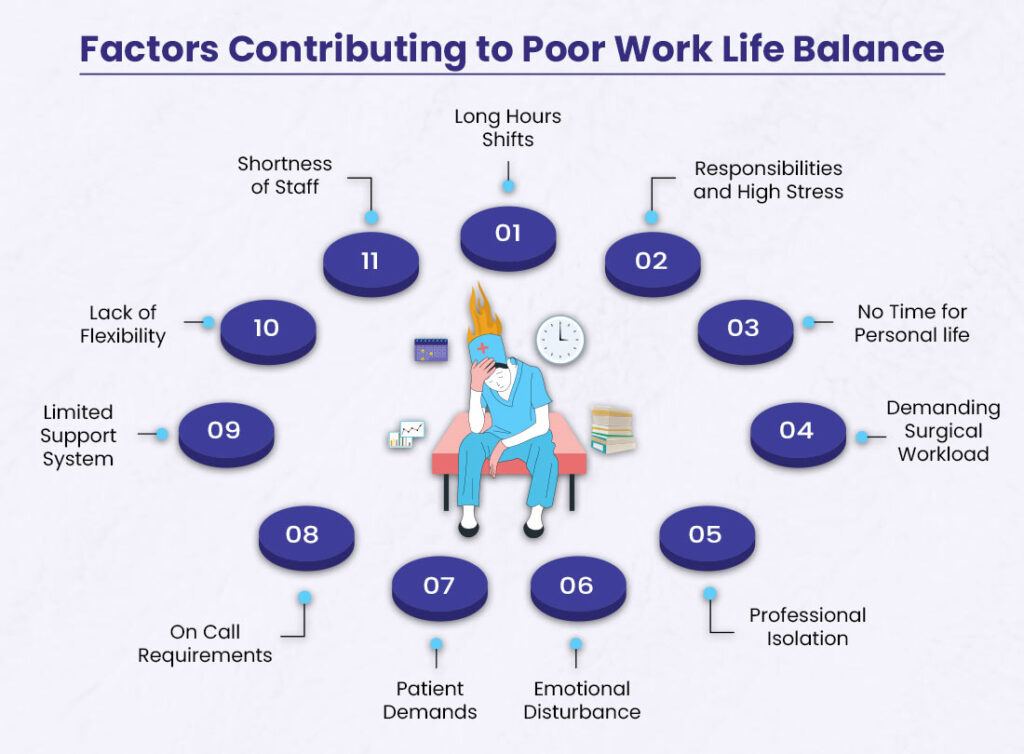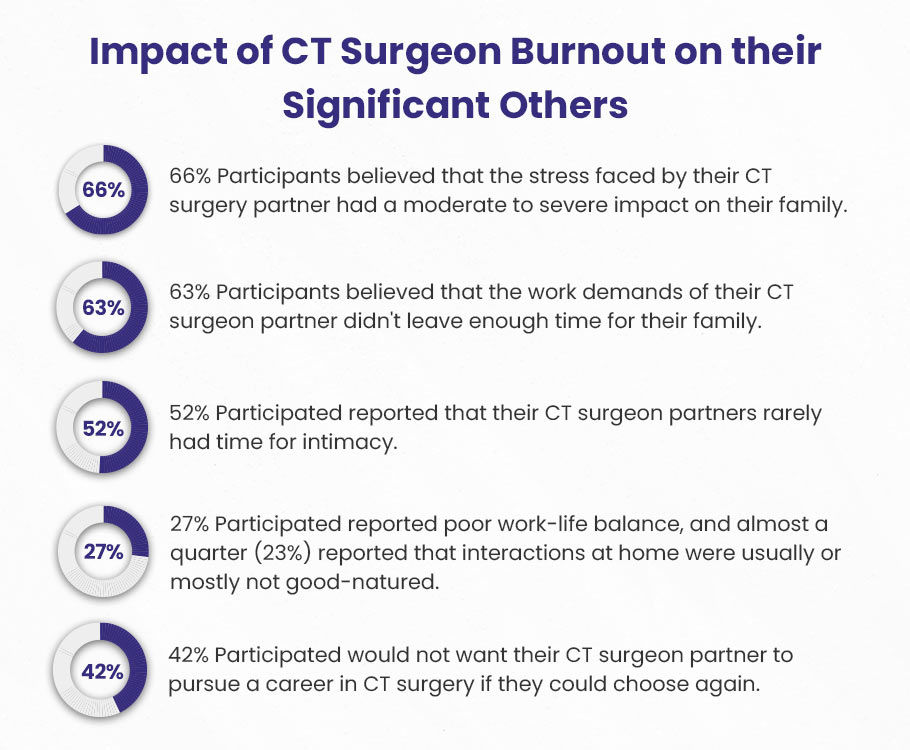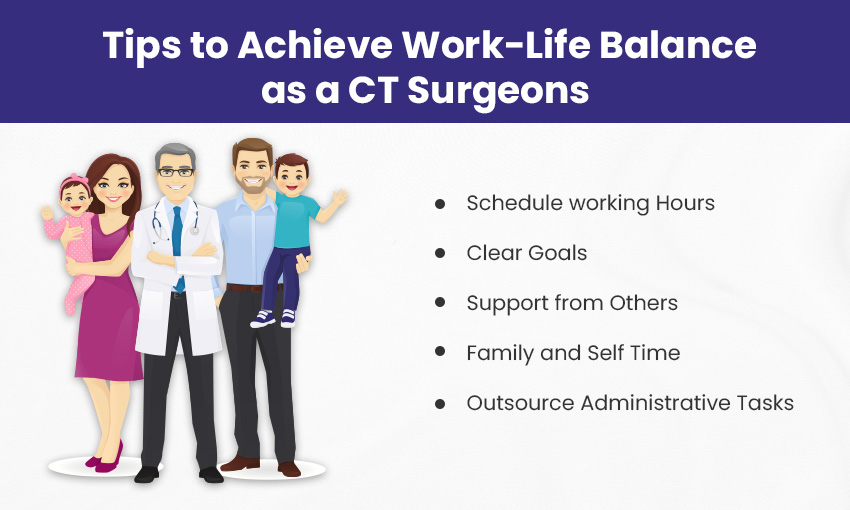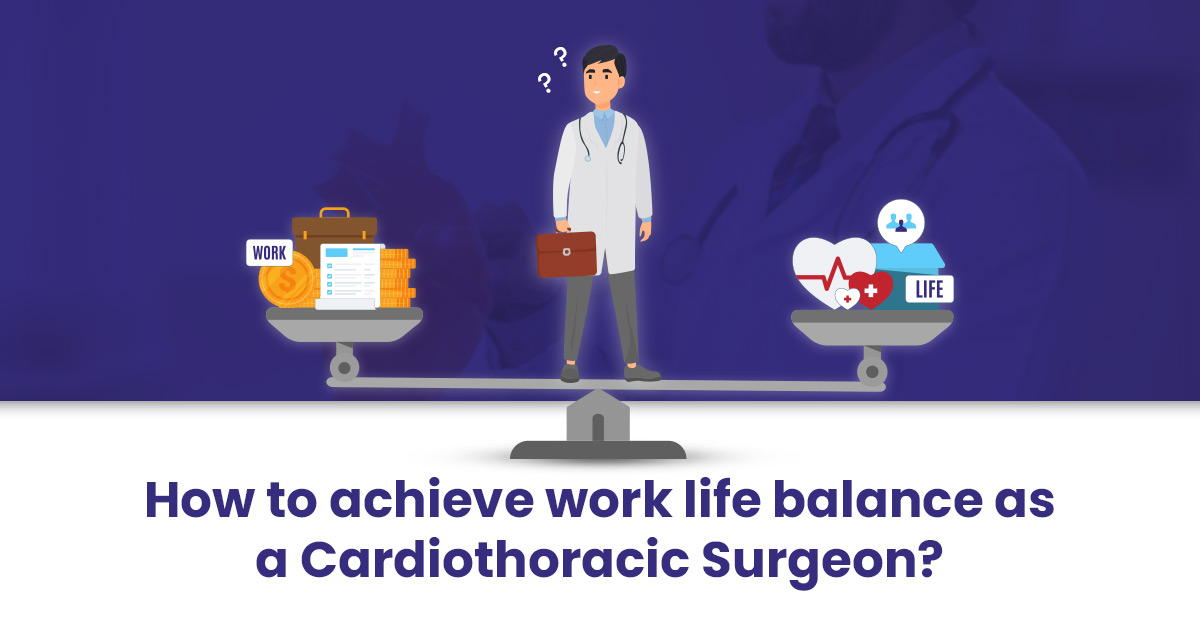Being a Cardiothoracic Surgeon is one of the most challenging jobs on Earth. The sense of responsibility a CT surgeon carries on their shoulders all the time is appreciated. They manage substantial work burdens, deal with severe patients, and tackle high-stress situations. For them, some days are never-ending. They have to stand tall all day long in the operation theater with the open chest of a patient and his heart in hand. It is not just a tiring job but emotionally disturbing because someone’s life depends on your quality of care.
Thoracic surgery certainly affords one a better lifestyle, but it is essential to have a work-life balance as a cardiothoracic surgeon to enjoy it. Underneath the mountain of job responsibilities as a CT surgeon, this specialty suffers greatly.
But don’t worry. In today’s blog, we will discuss how you can achieve work-life balance as a cardiothoracic surgeon and enjoy life in your profession.
Factors Contributing to Poor Work Life Balance
There can be many reasons that contribute to poor work-life performance as a cardiothoracic surgeon. The list is never ending but we have listed some of them for you below.

- Long hours shifts
- Responsibilities and high stress
- No time for personal life
- Demanding surgical workload
- Professional isolation
- Emotional disturbance
- On-call requirements
- Patient demands
- Limited support system
- Lack of flexibility
- Shortness of staff
All these reasons can lead a CT surgeon to burnout. These factors affect cardiothoracic surgeons’ work productivity and quality of life.
“When work is a pleasure, life is a joy. When work is duty, life is slavery.” — Maxim Gorki
The Risk of Burnout Among Cardiothoracic Surgeons
Indeed, Cardiothoracic surgery is a highly demanding field in healthcare, but you have to work in a high-stress environment and face technical challenges. It is a prideful job, but the stress and emotional toll can lead a cardiothoracic surgeon to suffer from burnout. The rate of burnout in cardiothoracic surgeons is increasing, and it is an overlooked challenge.

“Surgeons are at great risk for developing burnout symptoms because of long work hours, delayed career gratification, and what is admittedly not the best work-life balance.” — Thomas K. Varghese Jr., MD, MS
Several surveys and case studies have been conducted regarding burnout in Cardiothoracic surgery. The results of these surveys turned out to be alarming. A Society of Thoracic Surgeons survey in 2021 shows that 55% of the participants met the burnout criteria. In addition, the burnout in younger surgeons and education seekers was higher.
Furthermore, another case study by Chow et al. proved that the burnout rate in cardiothoracic surgeons is higher than in other specialty surgeons.
The consequences of burnout aren’t just affecting the mental health of the surgeons but also the quality of patient care. All these scenarios contribute to decreased job satisfaction and an unhappy life. The complex nature of this field promotes stress among surgeons. The high-stress environment to perform surgical procedures causes burnout in residents.
The Impact of CT Surgeon Burnout on their Jobs and Significant Others
Burnout in CT surgeons because of the poor work-life balance can have extreme effects on their lives and work as well. It can cause an increased risk of medical errors and poor patient care. Due to burnout, the surgeons may lose focus, which leads to mistakes, frustrations, and self-doubt.
The Wellness Committee of the American Association for Thoracic Surgery ( AATS) designed a wellness survey of 33 questions. They distributed it to self-disclosed spouses and significant others of AATS members and CT surgery attendees of the 2021 Annual Meeting.
The alarming results of those 238 survey participants paint a stark picture of the situation. The impact of burnout on cardiothoracic surgeons and their families is not to be underestimated. Let’s have a look at them.
- 66% believed that the stress faced by their CT surgery partner had a moderate to severe impact on their family.
- 63% believed that the work demands of their CT surgeon partner didn’t leave enough time for their family.
- 52% reported that their CT surgeon partners rarely had time for intimacy.
- 27% reported poor work-life balance, and almost a quarter (23%) reported that interactions at home were usually or mostly not good-natured.
- 42% percent would not want their CT surgeon partner to pursue a career in CT surgery if they could choose again.

The impact of these results was higher in the significant others of CT Surgeons having less than 5 years into their careers and experience working with private practice. In addition, CT surgeons work 68-74 hours per week longer than 58-60 hours per week. Having younger children, especially those under 19, and lacking work support worsened their overall well-being.
How CT Surgeons Can Achieve Work-Life Balance?
The first step towards a fulfilling career is to understand the significance of work and personal life balance. By setting time for your loved ones and yourself, you can make informed career path decisions for better overall well-being.
The patient population in CT surgery is tougher and sadder, but the lifestyle will be better if you enjoy thoracic surgery. Overall, the job can be physically and emotionally demanding, but it is also highly rewarding for those passionate about the field. So, it is important to maintain a work-life balance as a Cardiothoracic Surgeon. We have discussed some practical ways to help you reduce your work stress and have a better personal and professional life. So, let’s begin!

Schedule Working Hours
It is essential to have a work schedule to maintain your work-life balance. Make a schedule for each week or hour in a day. For instance, It depends on how many cases you can handle in a week’s rotation with other Cardiologists and how complex the case will be. You need to be alert and have plenty of rest.
If the case is challenging and complex, you need to have a backup plan to do the surgery with the help of an assistant surgeon. The better way to do the job is elective surgery. You can schedule it in an appropriate and timely manner.
You can maintain a healthy work-life balance by making a timetable of specific periods for surgeries, patient consultations, administrative tasks, and personal time. It will also help you to avoid working long hours.
Set Clear Goals
To achieve your career goals as a CT surgeon, make long-term growth plans and work on them steadily. Set clear expectations for your profession and your family.
Working on those goals and trying to sustain them will help you stay motivated. Read your job contracts and compare them with your current job responsibilities.
If you are working outside the contract, try to make things along with it. If you need to move to another city for an academic job, talking to the family will be helpful, as family flexibility is crucial. Otherwise, it can be stressful.
Get Support from Others
When you work alone or deal with many work responsibilities alone, the lack of support causes stress, burnout, and poor work-life balance. Seek help from fellow surgeons and divide your task with others. It will reduce your burden and give you some free time.
Talk to others about what you are going through or the challenges you face in your profession. Sharing your problems with others will allow you to express your emotions or dissatisfaction and help you find the best solution for your problems.
Moreover, interact with people outside the working space and working hours. It will help you have fresh perspectives, real-life experiences, and advice related to work.
Prioritize Family and Self Time
CT surgery is a demanding and time-consuming job. It leaves you with minimum time for your self-care and family. Your health and well-being are as necessary as others to keep performing your services as a cardiothoracic surgeon. For that, make time for your ME time and self-care, and focus on your own relaxation and peace. You can try meditation and spa for a calm, healing, and stress-free routine.
In addition, family time plays a vital role in healthy mental health. Go on vacations and trips with your family to have quality family time and make beautiful memories. It will help you stay happy and positive towards everything.
Outsource Administrative Tasks
One of the most helpful ways to achieve work-life balance and have some free time for yourself is to outsource your administrative tasks. These tasks cost you the majority of your time and energy. Outsourcing your administrative tasks will reduce your work burden by less than half. You can easily focus on your patient care and your personal well-being.
Several medical billing companies in the USA are working and helping surgeons like you. With the help of professional and highly experienced staff, you will have efficient and quality outcomes. As a result, you will have all the time to spend with your family or have rest, self-care, and quality patient care.
Conclusion
“When you have balance in your life, work becomes an entirely different experience. There is a passion that moves you to a whole new level of fulfillment and gratitude, and that’s when you can do your best… for yourself and for others.” — Cara Delevingne
To sum up, you have your whole life other than work life. Work is just a part of life, not life. Learn to maintain that good work-life balance.
We hope the above-discussed causes and tips to achieve work-life balance as a Cardiothoracic Surgeon will help you in real life. You must implement these tips in your professional life. CT surgery is undoubtedly the most responsible field in healthcare, but you should be in an excellent physical and medical state to offer your services as a cardiothoracic surgeon.





